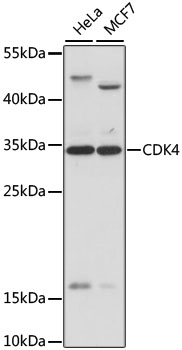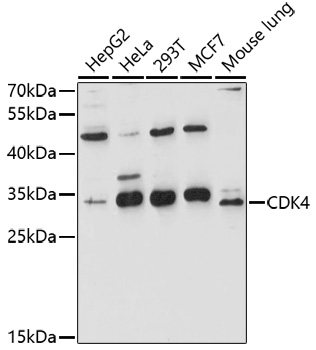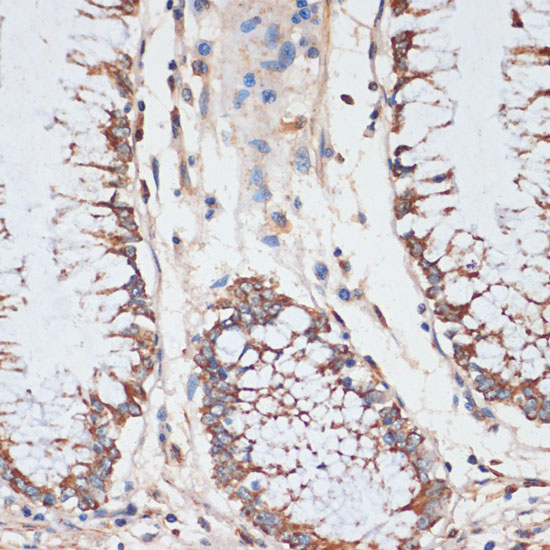Product Detail
Product NameCDK4 Antibody
Host SpeciesRabbit
ClonalityPolyclonal
IsotypeIgG
PurificationAffinity purification
ApplicationsWB,IHC
Species ReactivityHuman,Mouse,Rat
SpecificityThe antibody detects endogenous level of total CDK4 protein.
Immunogen TypePeptide
Immunogen DescRecombinant fusion protein of human CDK4 (NP_000066.1).
Target NameCDK4
ConjugateUnconjugated
Other NamesCDK4;CMM3;PSK-J3
Accession NoUniprot:P11802
GeneID:1019
Uniprot
P11802
Gene ID
1019
Sdspage MW34kDa
Concentration1.0mg/ml
FormulationPBS with 0.02% sodium azide,50% glycerol,pH7.3.
StorageStore at -20˚C. Avoid freeze / thaw cycles.
Application Details
WB 1:500 - 1:2000
IHC 1:50 - 1:200
Western blot analysis of extracts of various cell lines, using CDK4 antibody.
Western blot analysis of extracts of various cell lines, using CDK4 antibody.
Immunohistochemistry of paraffin-embedded human colon using CDK4 antibody.
The protein encoded by this gene is a member of the Ser/Thr protein kinase family. This protein is highly similar to the gene products of S. cerevisiae cdc28 and S. pombe cdc2. It is a catalytic subunit of the protein kinase complex that is important for cell cycle G1 phase progression. The activity of this kinase is restricted to the G1-S phase, which is controlled by the regulatory subunits D-type cyclins and CDK inhibitor p16(INK4a). This kinase was shown to be responsible for the phosphorylation of retinoblastoma gene product (Rb). Mutations in this gene as well as in its related proteins including D-type cyclins, p16(INK4a) and Rb were all found to be associated with tumorigenesis of a variety of cancers. Multiple polyadenylation sites of this gene have been reported.
If you have published an article using product 32073, please notify us so that we can cite your literature.
et al,Monoclonal antibodies to activated CDK4: use to investigate normal and cancerous cell cycle regulation and involvement of phosphorylations of p21 and p27. In Cell Cycle on
2021 Dec 16 by Katia Coulonval, Vincent Vercruysse,et al..PMID:34913830
, (2021),
PMID:
34913830
et al,CD155 Cooperates with PD-1/PD-L1 to Promote Proliferation of Esophageal Squamous Cancer Cells via PI3K/Akt and MAPK Signaling Pathways. In Cancers (Basel) on 2022 Nov 15 by Xiyang Tan, Jie Yang, et al..PMID:36428703
, (2022),
PMID:
36428703
et al,Eurycomalactone switched hepatocellular carcinoma cells into quiescence through 5'tRFAla/DVL/β-catenin pathway inhibition.
, (2025),
PMID:
40128187





 Yes
Yes



